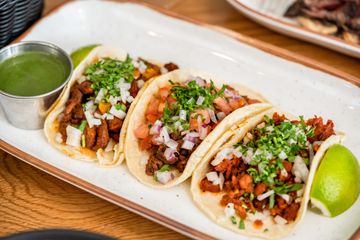Explore top-rated dishes served at best mexican westchester NY restaurants
Is Mexican Food Healthy And Balanced? Unboxing the Nutritional Perks of Conventional Active Ingredients
The inquiry of whether Mexican food is healthy and balanced welcomes an exploration of its typical ingredients. Beans and corn function as fundamental staples, abundant in protein and fiber. Avocados supply helpful fats, while various natural herbs and spices add flavor and health benefits - mexican food. Together, these elements create a tapestry of nourishment. However, the healthiness of Mexican food often depends on preparation methods and section dimensions. What role do these variables play in determining its total nutritional worth?
The Power of Beans: Protein and Fiber-Rich Staples
Typically ignored, beans serve as a foundation of Mexican food, providing a wide range of nutritional advantages. Rich in protein, they are an excellent plant-based choice for those seeking to meet their dietary protein needs. This high healthy protein content sustains muscle mass repair work and growth, making beans important for both vegetarians and meat-eaters alike. In addition, beans are a remarkable source of dietary fiber, which helps in digestion and advertises a feeling of volume, potentially aiding with weight management.
The range of beans utilized in Mexican recipes, such as black beans, pinto beans, and kidney beans, adds to a varied taste account and can improve dishes nutritionally. Beans are low in fat and contain essential vitamins and minerals, consisting of iron, folate, and magnesium. Together, these features make beans an important ingredient, supplying both sustenance and sustenance in standard Mexican price.

Corn: a Versatile Grain With Nutritional Conveniences
Corn attracts attention as a versatile grain basic to Mexican cuisine, celebrated not just for its culinary applications yet also for its outstanding nutritional account. As a primary active ingredient in dishes like tortillas, tamales, and pozole, corn offers crucial nutrients that add to a well balanced diet. Rich in carbohydrates, it serves as a substantial energy resource, while likewise being reduced in fat, making it a positive alternative for different dietary requirements.
Furthermore, corn is a great source of nutritional fiber, which assists in food digestion and advertises satiation. It includes considerable quantities of vitamins such as B-complex vitamins, which are crucial for basal metabolism. The presence of antioxidants, especially carotenoids, adds to general health by minimizing oxidative stress. Additionally, corn is gluten-free, catering to those with gluten level of sensitivities. On the whole, the nutritional advantages of corn emphasize its value in typical Mexican food and its duty in a healthy diet plan.
Avocados: Healthy Fats and Nutrients in Every Bite
Avocados play a substantial function in Mexican cuisine, complementing dishes with their luscious texture and abundant flavor. Past their cooking allure, avocados are celebrated for their excellent dietary profile. They are a rich source of healthy and balanced monounsaturated fats, which can assist lower negative cholesterol levels and support heart health. In addition, avocados are packed with vital vitamins and minerals, consisting of potassium, vitamin E, and B vitamins, adding to total health.
The high fiber web content in avocados help food digestion and promotes satiation, making them a useful enhancement to any meal. Their one-of-a-kind nutrient structure can additionally sustain skin wellness and offer anti-inflammatory advantages. Incorporating avocados into standard Mexican recipes or appreciating them as a standalone snack can enhance both flavor and nutrition, demonstrating why they are a cherished staple in Mexican food. On the whole, avocados provide a scrumptious way to take pleasure in healthy fats and important nutrients in every bite.
Herbs and flavors: Flavorful Health Boosters
While taking pleasure in the Homepage rich tastes of Mexican cuisine, one can not neglect the vital duty that spices and natural herbs play in enhancing both taste and health. Components such as chili, cilantro, and oregano peppers not only add to the vibrant taste account however additionally provide significant health benefits. Cilantro is known for its detoxing residential properties, helping to remove heavy metals from the body, while oregano is packed with click here for info anti-oxidants and possesses anti-inflammatory impacts.
Chili peppers, a staple in many Mexican dishes, include capsaicin, which has actually been connected to enhanced metabolic rate and pain relief. Additionally, seasonings like cumin and coriander assistance digestion and might assist in blood sugar level regulation. Integrating these tasty health and wellness boosters into meals not just improves the culinary experience but also promotes overall health, making Mexican food not just tasty, yet additionally nutritionally advantageous.
Conventional Cooking Approaches: Enhancing Nutrition and Taste
Traditional food preparation techniques in Mexican food play a crucial duty in improving both nourishment and taste, as they frequently focus on time-honored strategies and fresh components. Techniques such as nixtamalization, where corn is soaked and prepared in an alkaline solution, not only boost the nutrient account of tortillas but also boost their digestibility - best mexican westchester NY. In addition, making use of slow cooking approaches, like stewing or braising, allows flavors to combine magnificently while retaining the integrity of the components

Frequently Asked Questions
Are Mexican Food Portions Generally Larger Than Other Foods?
Mexican food parts are commonly larger than those of numerous other foods. This characteristic reflects traditional dining practices, stressing public sharing and hearty dishes, which can result in a more significant serving dimension in general.
How Does the Prep Work Method Affect Healthfulness of Mexican Food?
Preparation methods greatly affect the healthiness of Mexican food. Techniques such as grilling or steaming maintain nutrients, while frying can boost undesirable fat content. Choices of active ingredients and cooking designs eventually establish general nutritional worth.
Can Mexican Food Be Tailored for Certain Dietary Restrictions?
Mexican food can without a doubt be tailored for particular nutritional limitations. Replacements, such as utilizing corn tortillas for gluten-free diets or integrating dragon house even more veggies, allow individuals to take pleasure in conventional tastes while suiting different nutritional requirements.
What Prevail Misunderstandings Concerning Mexican Food and Health?
Usual misconceptions regarding Mexican food consist of the idea that it is inherently undesirable, extremely zesty, and solely concentrated on fats. In truth, typical recipes usually include nourishing ingredients and can be tailored to different nutritional demands.
Are There Healthier Choices at Mexican Restaurants?
Healthier options at Mexican restaurants usually include barbequed meats, beans, and fresh veggies. Selecting meals that highlight whole ingredients and avoiding heavy sauces can lead to a more healthy eating experience, promoting general well-being.
The selection of beans used in Mexican dishes, such as black beans, pinto beans, and kidney beans, adds to a varied taste profile and can improve meals nutritionally. Avocados play a substantial function in Mexican cuisine, matching dishes with their creamy texture and rich taste. Including avocados right into conventional Mexican dishes or appreciating them as a standalone treat can boost both taste and nourishment, demonstrating why they are a beloved staple in Mexican cuisine. While enjoying the abundant flavors of Mexican cuisine, one can not neglect the necessary role that spices and herbs play in improving both preference and health and wellness. Typical food preparation techniques in Mexican cuisine play an essential duty in enhancing both nourishment and taste, as they frequently focus on fresh ingredients and time-honored techniques.